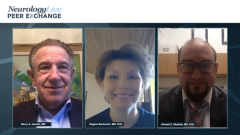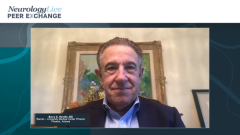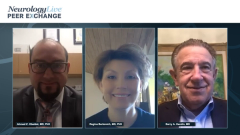
Future of MS With BTK Inhibitors
Regina Berkovich, MD, PhD, and Barry A. Hendin, MD, review potential use of BTK inhibitors in the treatment of MS.
Episodes in this series

Ahmed Z. Obeidat, MD, PhD: We discussed BTK [Bruton tyrosine kinase] inhibition. I want to discuss your vision for BTK inhibition as it potentially comes to the market. Once the trials are done, hopefully there’s a positive effect on MS [multiple sclerosis], particularly looking at progression or even relapsing MS. One of these agents may affect the central nervous system early in relapsing MS, which may prevent progression. Dr Berkovich, give us a few more words on BTK inhibitors.
Regina Berkovich, MD, PhD: They’re still in development. We’re going through phase 3 studies for several of them. My center is involved with a few as well. One thing to mention is the discussion of route of administration. This one is very convenient because it’s a pill. Many patients will be happy to learn that. It’s being compared in many studies with an active comparator. We’re looking to compare it to the medication of the new era, not to one of the injectable medications, but rather to teriflunomide, which we all became comfortable with over the last 10 years.
It could be an excellent addition to our armamentarium, because not only does it involve itself in the differentiation of the B cells, the mechanism of action of the drug, but it also has a positive impact on the microglia in the central nervous system. Therefore, we can expect twofold mechanisms on potentially inflammation and the preservation of CNS tissue. I’m looking forward to seeing the final results and efficacy of those studies. Once approved, it will be an excellent addition to what we have.
Ahmed Z. Obeidat, MD, PhD: Thank you very much. Dr Hendin, give us a few final words on BTK.
Barry A. Hendin, MD: We’re all looking forward to ECTRIMS [European Committee for Treatment and Research in Multiple Sclerosis Congress] where the phase 3 data will be presented. I believe we’ll see the first BTK inhibitors in the last quarter of this year or the first quarter of next year. I anticipate that we’ll see the first entries soon.
There are more than half a dozen being investigated. The hope is that they’ll be well tolerated, easily taken, and low and that they’ll have a good benefit-risk ratio. Then the question is, “Where will we use it?” Will we use it early to reduce acute and smoldering inflammation or late to deal with late progression and smoldering inflammation? These are the things we’re going to learn. But to the extent that this is a new concept, a different mechanism, and perhaps an answer to an unmet need, I’m excited. All of us are probably engaged in these trials. I don’t think we have the full answers, but there’s a lot of hope.
Ahmed Z. Obeidat, MD, PhD: Thank you very much. I share the same thoughts as both of you. It’s very exciting, and we’re hopeful to see the results when they’re presented, hopefully later this year or early next year.
Transcript Edited for Clarity
Newsletter
Keep your finger on the pulse of neurology—subscribe to NeurologyLive for expert interviews, new data, and breakthrough treatment updates.














